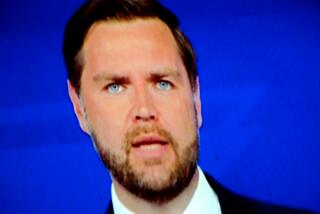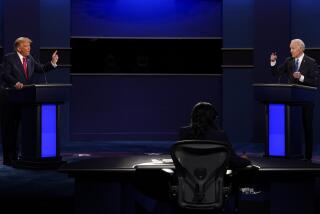Win or Lose, Perot Changing Rules of Game
- Share via
With little more than two weeks left in the presidential race, independent candidate Ross Perot appears to be having a bigger impact on the political process than he may have on the outcome of the election.
While Perot’s initial success in the presidential debates and the favorable reaction to his first commercials raised his standing in the public opinion polls by a few percentage points, most experts believe he has little chance of capturing the White House.
But there is no doubt in the minds of most political analysts that Perot’s unusual candidacy has already succeeded in altering the national political landscape, both in the short and long term.
For now, his campaign has forced President Bush and Democrat Bill Clinton to focus more of their attention on fiscal issues. Perot’s presence at Thursday night’s debate, as much as pressure from the audience, caused Bush and Clinton to engage in a serious discussion of the economy, according to aides to the major-party candidates.
“Perot is refocusing the attention on the issues facing this nation,” said Avis LaValle, Clinton spokeswoman. Torie Clarke, Bush’s spokeswoman, said: “Perot has shifted the debate from the state of the economy to what are you going to do about it. And that gives us more of an opening to talk about our programs versus Clinton’s.”
In the longer term, even if he fails to have a big impact in the November balloting, Perot is expected to remain a figure on the national scene who could help create support for deficit-cutting measures by the next President and the new Congress.
“He’s earned the right to be a national kibitzer,” said veteran Republican political consultant Doug Bailey.
In addition, Perot’s candidacy could encourage other non-politicians to run for office in the near future.
“There may be many would-be Ross Perots out there, who, if they cannot run for President, can at least enter the race for governor or challenge their member of Congress,” predicted Democratic consultant Ann Lewis.
Perot’s on-again, off-again presidential candidacy has never ceased to amaze the analysts this year. After gearing up for the race last spring--and taking a lead in some national polls--he abruptly decided against running last July, saying he had forced the Democratic Party to be more responsive.
When Perot re-entered the race on Oct. 1--just in time to appear with Clinton and Bush in the presidential debates--it was clear his mercurial behavior had undermined his support. A Times Poll in early October found only 9% of the voters favored him; 66% looked upon him unfavorably.
Then Perot’s performance in the first debate--as well as his first half-hour commercial--drew rave reviews. He was praised for his plain spoken, common sense approach to the problems facing the American economy. As a result, his ratings in many of the polls climbed above 10%.
But just as his popularity was growing, Perot suffered a setback when his handpicked vice presidential candidate, retired Vice Admiral James B. Stockdale, failed to deliver a strong performance in the debate among running mates.
After that debate, 56% of those polled by ABC said they would be less likely to support Perot because of Stockdale.
Perot’s appearance in the second presidential debate on Thursday night also lacked the luster of his first showing. His one-liners drew no laughs from an audience bent on hearing a serious discussion, and he carefully avoided discussing how to solve the problems he has so forcefully outlined.
“What seemed to be a novelty on Sunday had become predictable by Thursday,” said historian Louis L. Gould at the University of Texas. “(Perot) is finding out that television is a relentless consumer of good material.”
Gould recalled a quotation from the late political historian Richard Hofstadter, who said: “Third party candidates are like bees. Once they’ve stung, they die.”
Gould added: “Perot has stung and now he’s fading.”
Many analysts now believe that Perot’s candidacy will not be a factor in the outcome of the election, especially if Clinton maintains his current ample lead in the polls.
Still, if Clinton appears to be headed for a big victory, some analysts think there is a chance that Perot could enjoy a last-minute burst of support. “If people believe it is Clinton, Clinton, Clinton, they are going to feel free to cast a protest vote,” explained Bailey.
Under those circumstances, said John Sears, former campaign adviser to Ronald Reagan, there is even a remote chance that Perot could eclipse Bush in the balloting.
In any event, the Perot factor is expected to bring more voters to the polls than usual, perhaps even registering a rare increase in voter turnout. The Texas billionaire not only appeals to voters who previously have been turned off by the political system, but his commercials have helped to convince some Americans that this is a particularly crucial election.
“I have believed all year long that the public perceives this as a very important election,” said Bailey, the GOP consultant. “I think there will be a big turnout and Perot heightens that. . . . He makes the election more interesting.”
If Perot succeeds in luring many previous non-voters to the polls, according to Charles Cook, a Democratic political consultant, the larger turnout would likely be bad news for incumbents at all levels, from President to dog catcher. The new voters likely would be people who strongly dislike the status quo.
As a result of Perot’s apparent successes, few expect Perot’s call for deficit reduction to die with his candidacy. With the help of his nationwide political organization, United We Stand, America, Perot is likely to continue to assert his views in the years to come.
“I don’t think we’ve seen the last of him,” said Sears, who predicted that Perot would continue to appear frequently on television talk shows.
Cook said Perot’s high-profile advocacy of higher taxes and citizen sacrifice could make it easier for the next President to impose unpopular solutions in order to get federal spending under control. As Cook put it: “He’s got name ID; he’s got a big checkbook and credibility with a certain group of people.”
On the other hand, Perot could be an unwanted critic of any President who failed to follow his prescription for fiscal responsibility.
“I assume he’ll be around as something of a gadfly,” said Gould. “But if the new President succeeds in cutting federal spending, he’ll be just a footnote in history.”
More to Read
Get the L.A. Times Politics newsletter
Deeply reported insights into legislation, politics and policy from Sacramento, Washington and beyond. In your inbox twice per week.
You may occasionally receive promotional content from the Los Angeles Times.










